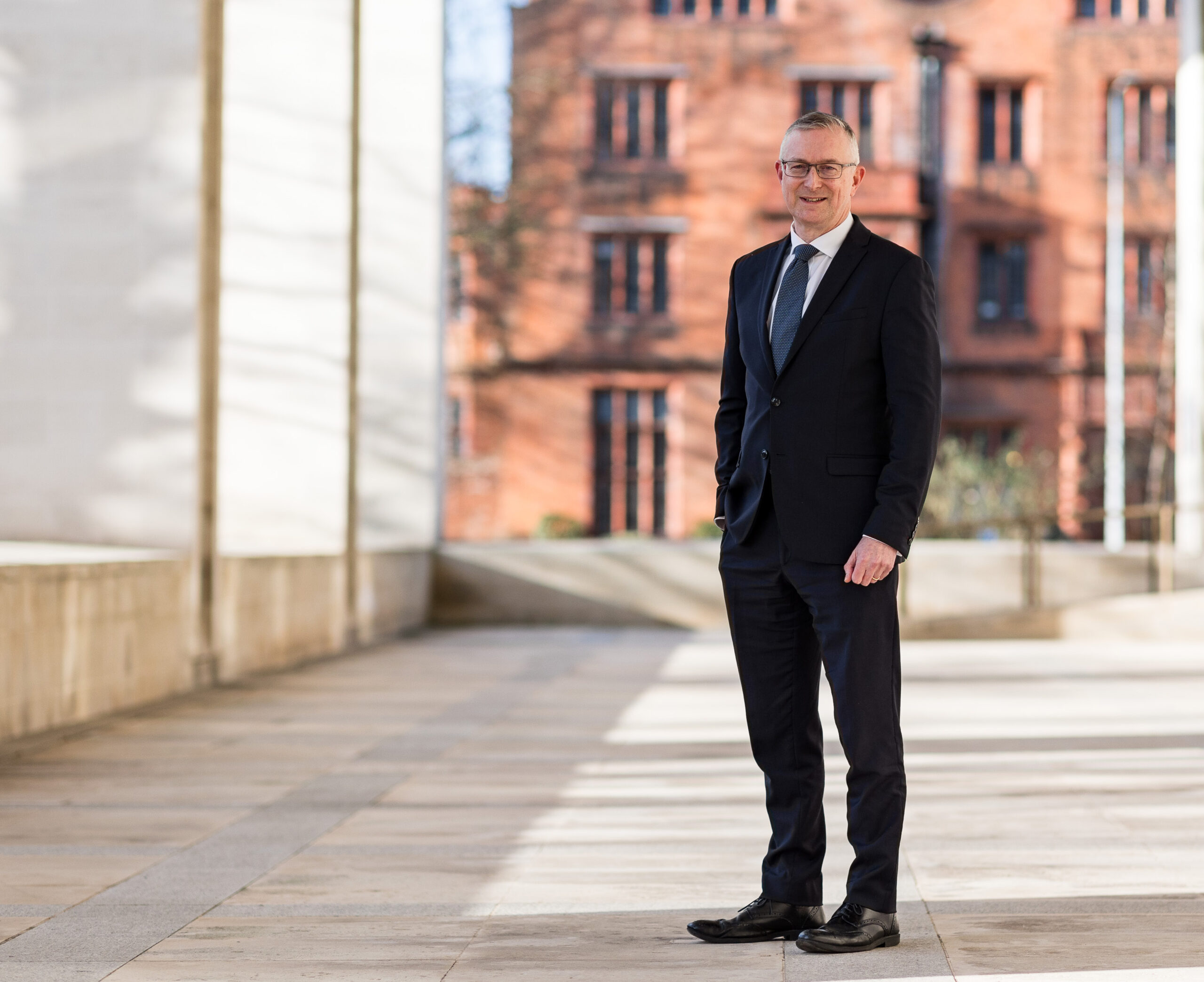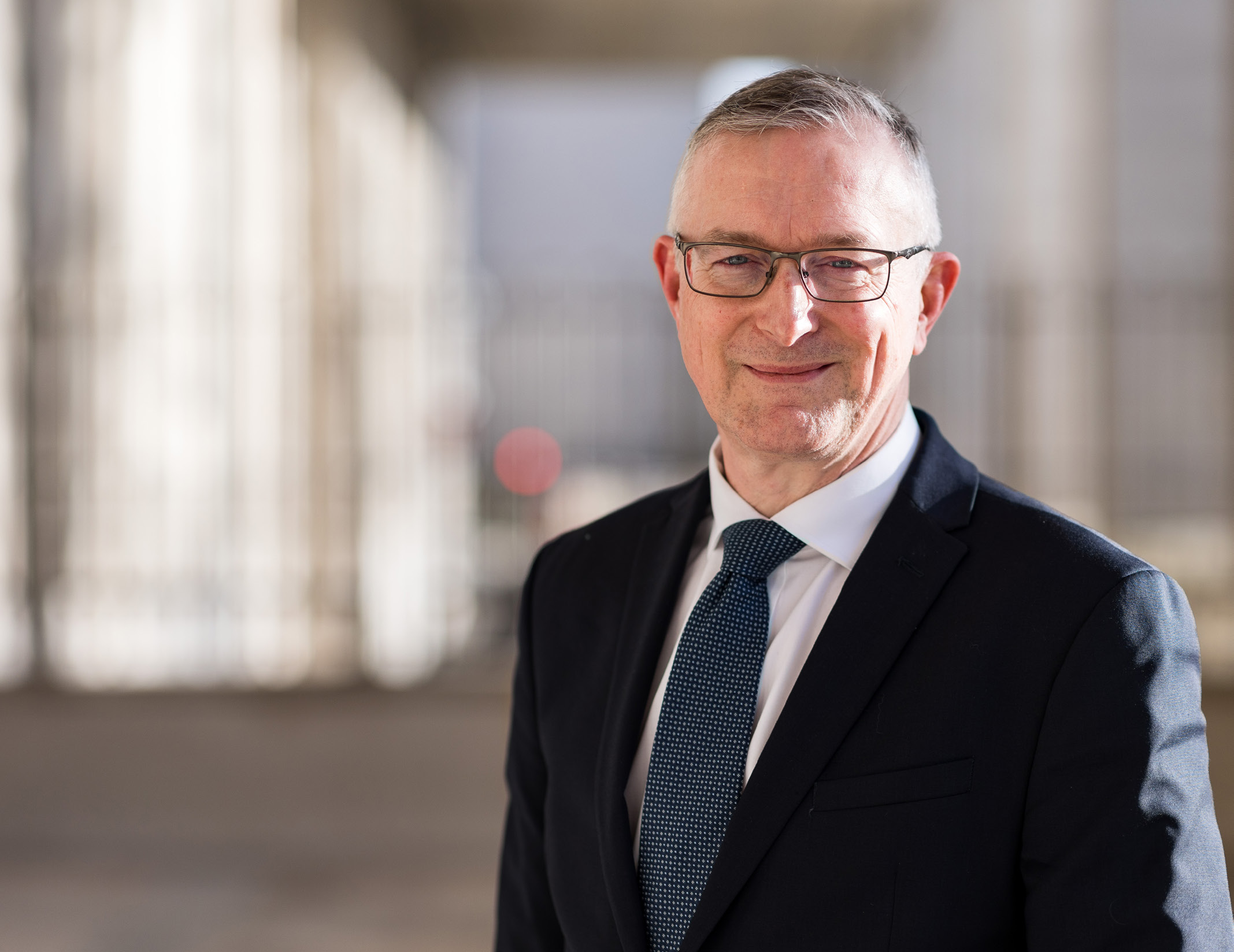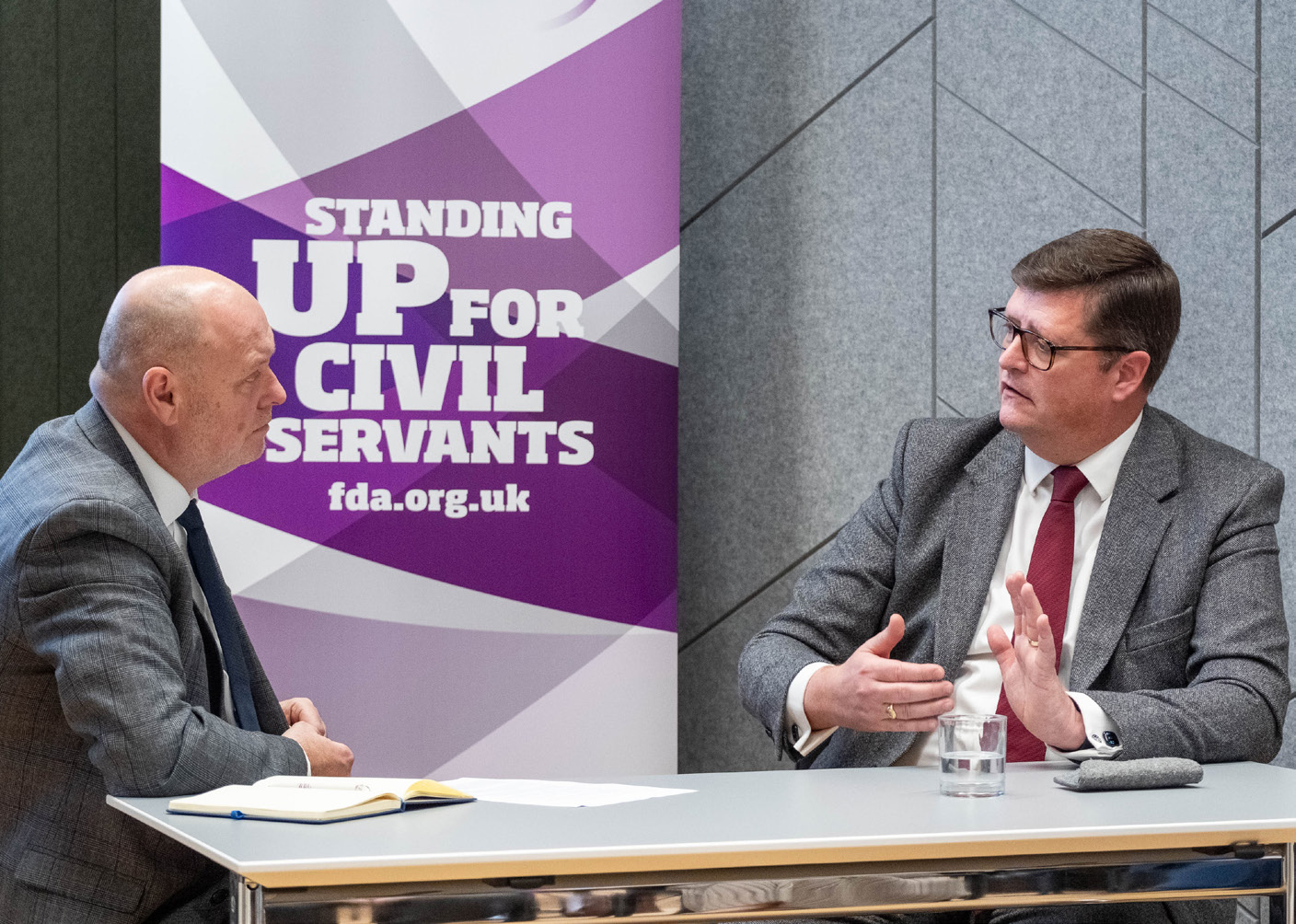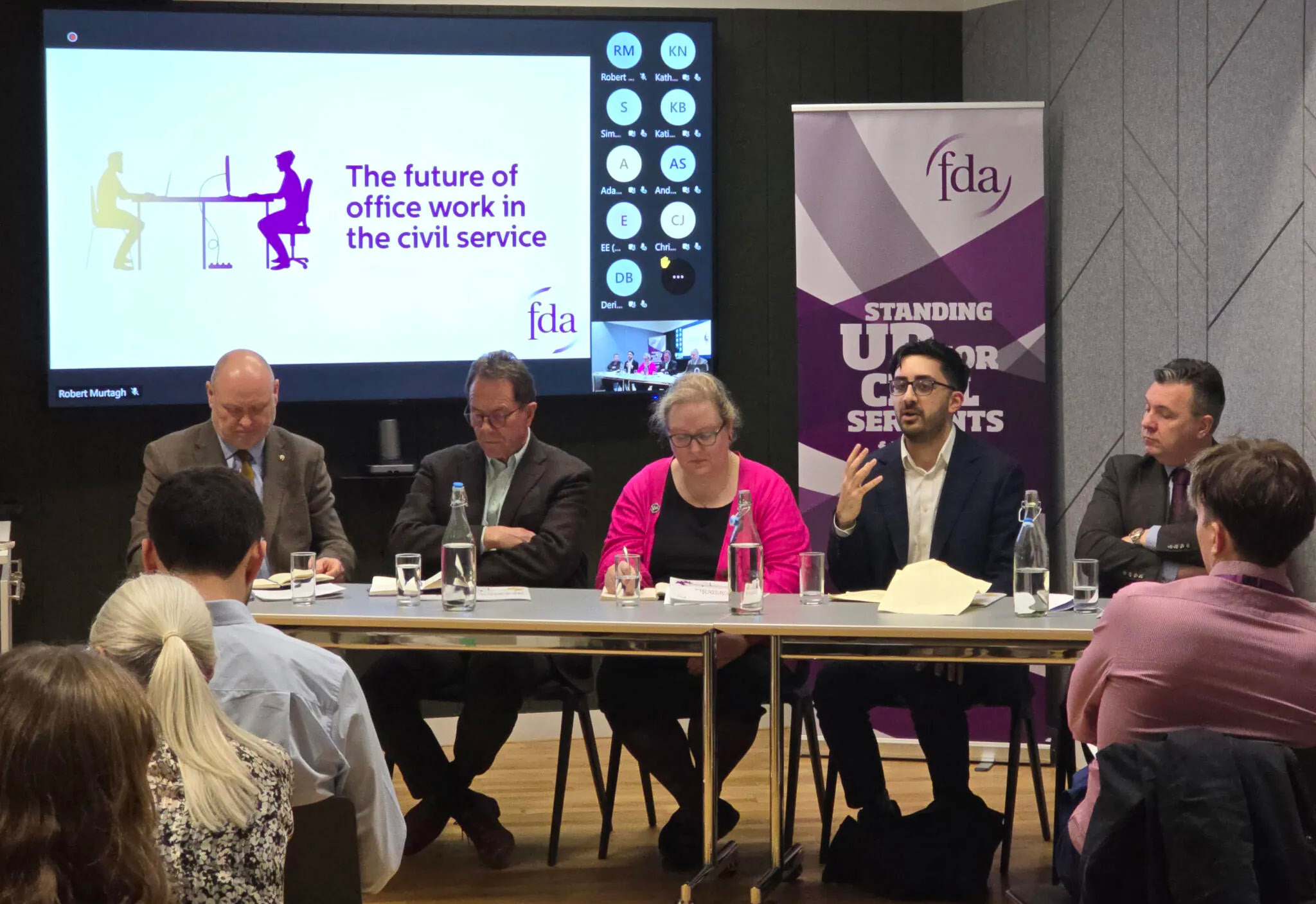Having an influence

Tommy Newell speaks to Permanent Secretary of the Welsh Government Andrew Goodall about the importance of social partnership, working as a hybrid organisation and utilising opportunities from Senedd reform.
For Andrew Goodall, public service was “a deliberate career choice”.
“The route into the NHS was something that I’d thought carefully about, even early on in my career,” he recalls. “I guess I was looking for an area where I could bring a sense of public values to the table.”
Working as an operational manager in the NHS gave Goodall the opportunity to not only “make a difference to patients” but also “support staff who want to come into work to do good things”.
Before taking up his current role as Welsh Government Permanent Secretary, Goodall worked in NHS Wales for more than 30 years, eventually taking over the top job of Chief Executive in 2014.
He jokes that when speaking with new apprentices, he describes how he “did start off by being an administrative assistant and being really excellent in photocopying”, after initially taking up a “summer holiday job” in the health service.
“I used to really enjoy the opportunity to work with frontline staff to show that I cared about the things that they wanted to sort out and resolve,” he says. “But I also really enjoyed that, even as a manager, I could work with communities across Wales where I was responsible for services. And actually, I could show that I wasn’t just a bureaucrat turning up. I was somebody who wanted to make sure that they were aware of the services we offered and the things that we were looking to change to make them better.”
While there aren’t quite so many opportunities to work directly with frontline staff in his current role, Goodall is keen to highlight “the breadth of things” that Welsh Government is responsible for and stresses that “there’s a real range” beyond “what people actually think the civil service represents”.
“We have delivery services right through to our heritage organisation, Cadw stonemasons, who are civil servants,” he says. “As well as social service regulators and then we have the more traditional civil service roles, excellent policy professionals in place who are giving that very direct and immediate advice to ministers.”
His enthusiasm for public service is palpable, and he encourages anyone thinking about their career “to recognise the wide range of opportunities that the civil service does offer” because “there is something that is going to be attuned to your skills and experience”. For Goodall, the “most important factor about working for the civil service and public services” is “that you can genuinely feel that you are having an influence, whether it’s on individuals or a service”.
In Wales, Goodall’s transition from his NHS career to a civil service career didn’t seem like a huge leap. As he explains: “It may seem a little unusual about that route, but in Welsh Government, the NHS Chief Executive role, which is also a director general role for health and social services, is actually located in Welsh Government. So it’s kind of line managed by government and then reports into ministers as well. I guess [I] wasn’t really thinking about whether I was moving completely into the civil service world at that time because I was simply following through on my NHS career.”
Moving from an organisation working outside government, there are some obvious differences in ways of working – as “you’ve got political oversight” in the civil service – but an unexpected difference Goodall picked up on was that the civil service “was a bit quieter about the pride it has for the role it plays”. He says he became acutely aware of this during the COVID-19 pandemic and he hopes he was able to convey the work the Welsh Government was doing.
“I thought the civil service should be very proud of everything that we did at that time,” he says. “Because it was a real chance to show that we were doing things for the people of Wales.”
While the pandemic may have made the work of Welsh Government more visible to the public, it also had a profound impact on the way the civil service works. The overnight move to remote working accelerated a change that was already taking place across both the private and public sector. Welsh Government has embraced this change and now operates as “a hybrid organisation”.
“We’re not designated as a home working organisation,” Goodall clarifies. “That’s quite an important distinction because it means that we believe that we can be productive and effective by working face to face and in an office environment, but also using the ability to be flexible and work remotely as well… What we want to do is to make sure that this is about how we ensure that the business and operational needs of the organisation, including political expectations, are met whilst being able to use the flexibility that is available to our staff from working from all sorts of different areas of Wales.”
This flexibility, Goodall believes, can open up opportunities for staff who previously may have faced barriers in their careers. Welsh Government staff work across “a range of different sites” and it is now much easier for those not based in Cardiff to work directly with ministers. Goodall says there is a great benefit to the “immediate access” you can get through some of the modern approaches introduced as part of hybrid and remote working. “Ministers can have people landing on screens in their offices rather than expecting somebody from Llandudno to have made their way down to Cardiff for a face to face meeting,” he says.
“There has been a feeling in the past about some of the arrangements and even career opportunities being Cardiff-centric,” Goodall adds. “And I think what a more flexible way of working through using the hybrid approach has shown is that it’s a bit more of a level playing field for progression opportunities and access to ministers from colleagues right across Wales.”
Welsh Government has entered the next phase of this work, which Goodall explains they’re calling “smart working”. He’s clear that he would like “to see more face to face” but says he wants to support line managers and staff “to get there in the right way”.
“What we’re noticing more is that you can see genuinely that people positively experience a face to face contact when there is a clear purpose,” he says. “But what you don’t want to end up with is a mechanism where everybody’s in potentially face to face, but finding themselves just all alongside each other in Teams meetings.”
Goodall says recent discussions with new and younger staff suggest “that they do welcome actually having some of the more direct and personal contact because they’re at the outset of their careers” and haven’t had a chance to build experience or relationships. He believes as the organisation figures out this new way of working, the key will be to keep listening to staff experiences and, when working in person, always make sure “you’re doing it for a purpose, you’re actually doing it because it is effective”.
While not quite the level of churn seen in 10 Downing Street over recent years, since Goodall took up his position as Permanent Secretary, he has served under three different First Ministers. Throughout those changes in political leadership, civil servants in Welsh Government help to provide transition support. Goodall says he hopes he was able “to give good advice” and provide stability, so staff “felt that they were able to carry on with their day to day activities and, ultimately, have an understanding of what the new First Minister of Wales really requires”.
A more fundamental change is on the horizon with the forthcoming Senedd reform. This will see the Senedd increase in size from 60 to 96 members and increase the limit on the number of Welsh ministers who can be appointed from 12 to 17 (plus the First Minister and the Counsel General) with the ability to further increase the number to 18 or 19 with the Senedd’s approval. The Senedd Cymru (Members and Elections) Act also introduces reform of the electoral system in Wales, with a new proportional representation system, 16 new Senedd constituencies and elections to be held every four years.
Goodall describes this as a “generational change about the way in which the Senedd will work, but in particular the way in which scrutiny of government is going to work in Wales”. While this is “a political change” it will clearly impact the way the civil service works, which he thinks can be an “opportunity to work differently within our own government machinery”.
“It means that we can challenge some of the existing processes and protocols that are there,” he adds. “I think it’s a chance for us to think about the way we do things, recognising the workload on our teams and staff already at the moment. Is it the chance to really switch and change the technology in a different way? What is the bilingual nature of the tasks that will come through, given the way in which we work, using both Welsh and English in our own procedures and the way in which the Senedd Commission does it as well? Can we just think a little bit differently about the way in which ministers are briefed on a range of different policy areas?”
It’s not for civil servants in Welsh Government to determine how parliamentary arrangements will work in a reformed Senedd but whatever shape this takes, “it’s going to mean that the way that scrutiny occurs is different. More members asking questions means more questions for ministers to answer supported by the civil service”. For Goodall, the job of Welsh Government civil servants is to make sure they are prepared.
“We need to be ready for spring 2026 for when it actually happens, because there will be a new government formed,” he explains. “Our responsibility will be to support it and that will be a government that looks different. So therefore, Welsh Government is going to have to look different as part of it as well. So it’s both a concern, I think, for staff in the organisation, but it is an opportunity because the policy is to increase the focus and scrutiny of Welsh Government and we absolutely need to make sure we support ministers in that task.”
Social partnership: ingraining a way of working

Social partnership is a key pillar of the work of Welsh Government, set out in legislation in 2023 – as the Social Partnership and Public Procurement (Wales) Act – that all public service organisations must follow. But what does it mean in practice for the day to day work of civil servants?
Goodall says it’s “really important” that social partnership principles “apply to the way in which Welsh government runs itself”.
“It affects policy development and the way in which teams and individuals think about the way they’re going to work,” he explains. “It sets an expectation, very formally, for us to reach out to experience outside of government to bring colleagues with us, whether that is on the trade union side or indeed whether it is working with our stakeholders, and it becomes a way in which we’re trying to ingrain… a way of working.”
This impacts the way in which unions operate in Welsh Government, and Goodall believes this approach ensures unions “are embedded” in the organisation.
“I think what really works in social partnership is in the way in which you can work with your union representatives, have formal conversations around the table, but make sure that people feel that they are a part of the wider outlook of the organisation and not just about negotiation,” he says.
Goodall says that social partnership isn’t “an easy thing to step into” and get right but, in his experience, “when there are difficult moments, because you’ve spent time together, I think you find a way of working through those together”.
“Social partnership isn’t about agreeing with everything on all occasions, but it is about creating the environment in which when there really is a problem that you feel you can work that through, hopefully professionally, and carry on the other side of those issues as well,” he adds.
Latest news
-

Under significant pressure: Interview with Director of Public Prosecutions
Tom Nathan speaks to Crown Prosecution Service Director of Public Prosecutions Stephen Parkinson about CPS’s handling of riots, the importance of impartiality and his plan to help reduce unmanageable prosecutor caseloads.
-

Changing the culture
HM Chief Inspector Sir Martyn Oliver sat down for an ‘in conversation’ event with FDA General Secretary Dave Penman, discussing the pace of change in Ofsted, challenging perceptions and tackling the long hours culture in Education.
-

Hybrid working: Led by evidence, not headlines
Tom Nathan shares the findings and recommendations of the FDA’s recent report on ‘The future of office working in the civil service’.